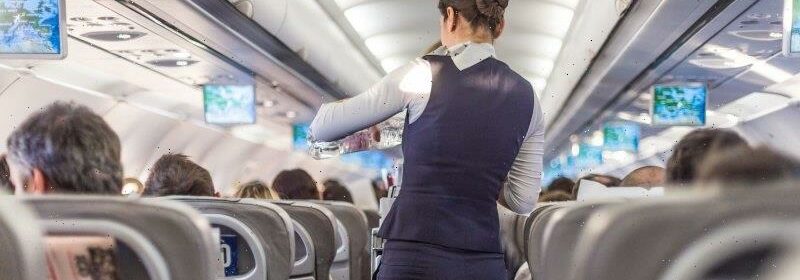Qantas flight attendants claim new EBA slashes rest time between shifts

Qantas flight attendants are outraged at the airline’s “diabolical” attempt to slash two hours off their rest times, claiming it will leave them only seven hours to sleep in some cases.
Under a confidential EBA proposal sent to Qantas cabin crew in August, flight attendants would have their minimum rest periods reduced from 12 to 10 hours.
Flight attendants are taking their fight against Qantas’ proposed EBA to the Fair Work Commission. Credit:SHUTTERSTOCK
Qantas is also seeking to increase shifts from 9.45 hours to 12 hours in duration, with an allowance for some shifts to blow out to 14 hours in unplanned circumstances.
The proposal comes amid controversy over Qantas chief executive Alan Joyce’s $287,000 pay rise and widespread customer service problems.
It has been slammed by the Flight Attendants’ Association of Australia and described as “diabolical” by one Qantas flight attendant, who said a 10-hour break between shifts did not allow for travel to and from the hotel, check-in time, or time zone differences.
“It takes 35 minutes, on a good day, to get to Melbourne airport and same to the hotel,” the Qantas flight attendant, who did not want to be named, said.
“Then by the time we check in and get into bed, we get seven hours sleep – if we’re lucky.”
The flight attendant said the current 12-hour rest period started 15 minutes after flight landing and ended 45 minutes before flight departure, despite being picked up from their hotel an hour and 15 minutes before departure.
Working 12 to 14 hours shifts would see flight attendants lose many of their overnight trips.
Crew are paid an additional “flying allowance” and “away from home allowance” for layovers.
“When I do overnights, it adds about $500 a week to my pay packet,” the flight attendant said.
Round trips from Perth to Melbourne and Perth to Brisbane could be completed within one shift, under the proposed EBA.
Qantas is also seeking to recruit casual staff, which they are unable to do under the current agreement. Casual crew would only get paid for travel time, not time away from home.
Another Qantas flight attendant, who also did not want to be named, said a shift duration of 12 to 14 hours might not seem a big deal to people that worked on the ground.
“But in the air, we can’t leave the office to go get some fresh air, get a coffee or lunch,” he said.
The attendant said reducing rest time to 10 hours was “completely unreasonable”.
“We could work 14 hours and then have 10 hours rest and then do another 14 the next day,” he said.
FAAA federal secretary Teri O’Toole said attendants were aviation first responders.
“If there’s a fire, they put the fire out. If someone needs to be arrested, they do it. If someone needs mouth-to-mouth resuscitation, they can’t call a doctor,” she said.
“They think flight attendants are just there to serve tea and coffee, but that’s on a good day.”
She said Qantas crew lost some of their sick leave when they reported fatigue, making some hesitant to report fatigue.
O’Toole also said Qantas’ EBA proposal of a 2 per cent pay increase each year for the next five years was insulting, particularly as there had been no pay rise for seven years.
Respiratory and sleep physician and Perth Sleep Clinic founder Dr Michael Prichard said many factors contributed to sleep deprivation and fatigue in the airline industry, including work time zone changes and the effect on circadian rhythm, or biological clock.
“When you calculate the actual opportunity to sleep after deducting travel time to work, delays, wind down from a stressful day, meals and personal hygiene, net sleep time is likely to be insufficient,” he said.
“A potentially sicker flight crew may actually cost more to the airline, once you factor in last-minute shift changes and leave cover.”
Qantas confirmed it was seeking to reduce crew rest periods to 10 hours between shifts when they were away from home, but only in the event of a disruption and when they did not have other crew based at that port.
“This more closely aligns with pilots’ rest requirements and will help recovery in the event of disruptions,” a Qantas spokesperson said.
“There are no changes planned to home-based rest in between duties.”
Two groups of Qantas domestic cabin crew filed application with the Fair Work Commission on Tuesday to hold votes on protected industrial action.
But the airline said the FAAA’s grounds to take this step towards industrial action were misleading.
The spokesperson said Qantas had rigorous fatigue-management processes in place, and the shift changes sought were “the same that apply to crew working at other domestic airlines in Australia”.
“The FAAA signed off these conditions on as part of agreements for those airlines, so it’s bizarre they’re now claiming they’re unsafe,” they said.
“The deal we’re proposing offers pay increases, the opportunity to secure thousands of dollars in incentives, and an expansion of overtime payments for our Qantas Domestic crew of up to 300 per cent.”
Follow WAtoday on Instagram, LinkedIn, Facebook and Twitter for handpicked selections of the day’s biggest local, national and international news.
Most Viewed in National
From our partners
Source: Read Full Article
